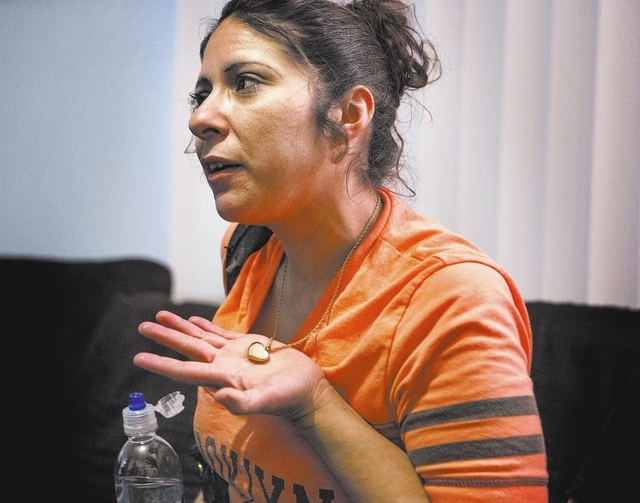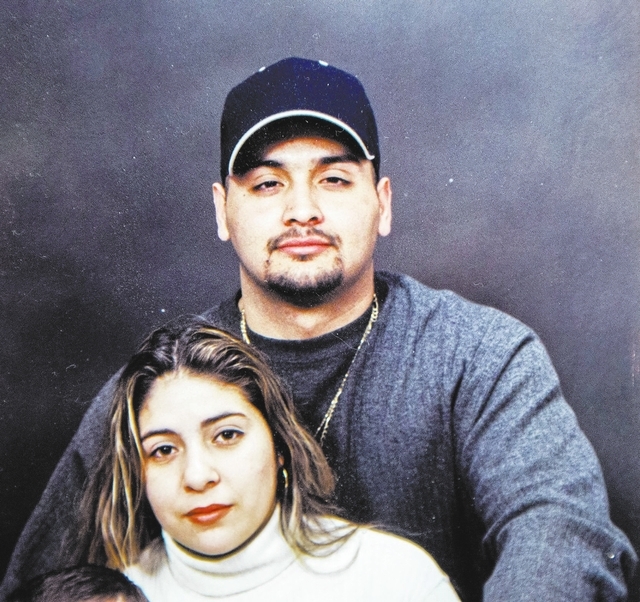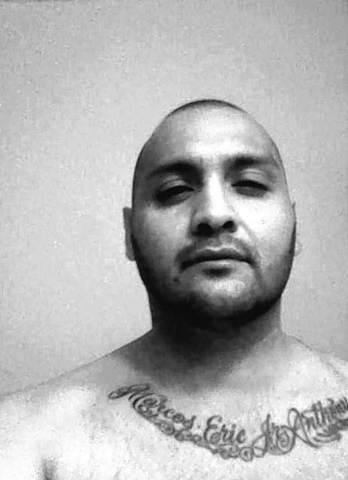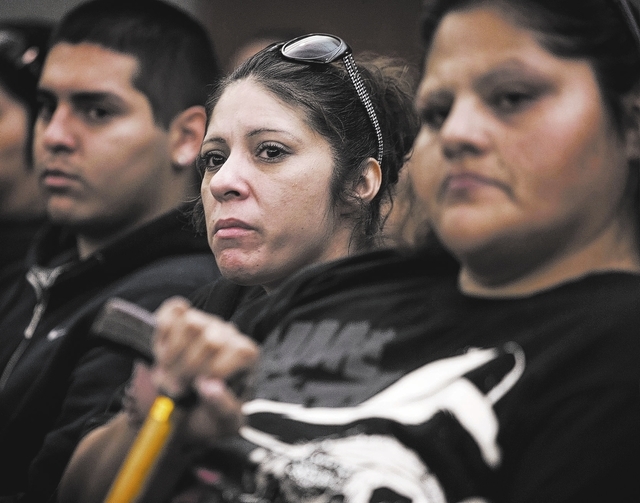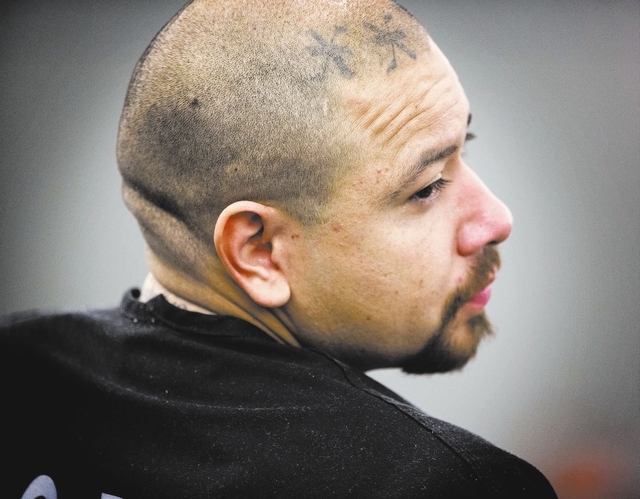Young father’s violent killing prompts investigation of gang leader’s plea deal
Eric Paul Montoya shouldn’t be dead.
The suspect in his slaying, Raul “Sparks” Gonzalez, should have been in jail when the father of four was killed in his Las Vegas home on Jan. 14.
But the Las Vegas Review-Journal has learned Gonzalez, a 33-year-old career violent criminal facing life in prison, was on the street because he agreed to inform on fellow 28th Street Gang members to the FBI-led Las Vegas Safe Streets Gang Task Force and Clark County prosecutors.
On Dec. 20, a District Court judge had accepted a deal cut by federal agents and local authorities and freed Gonzalez from jail with a warning: Stay out of trouble and keep in contact with police.
But Gonzalez didn’t stay out of trouble. It’s unclear, what if any, supervision the task force provided.
At least one document revolving around Gonzalez’s release from jail remains sealed in court files, and those involved in drafting it declined comment. Other records, courtroom video and other information obtained by the Review-Journal fill in many of the details.
‘HE’S AN INFORMANT’
Information about the incident is sketchy, but just days after he left jail, on New Year’s Eve, North Las Vegas police stopped a truck and questioned Gonzalez, Montoya and Jennifer Gascon, who was Gonzalez’s girlfriend and Montoya’s niece. The truck didn’t belong to them. Police also found a gun.
The truck and gun were seized, but Gascon and the men were let go though Montoya had two warrants for his arrest and Gonzalez couldn’t legally have a firearm. That night Montoya, 35, told Maria Landeros, his partner of 19 years and mother of his four sons, that he believed Gonzalez’s involvement had prompted special treatment.
“He told me, ‘Babe I think he’s an informant. Don’t ever repeat it. Don’t ever say nothing about it,’ ” Landeros said.
Montoya then avoided his friend.
Just before 6 a.m. on Jan. 14, Montoya answered a knock on his door and was met by five shots from a .357-caliber revolver fired through the door. He was hit twice.
Montoya’s young sons rushed to his aid after hearing the shots and their father’s bloody cry for help. He died later at a local hospital.
Gonzalez was quickly identified as a suspect after Gascon took her boyfriend’s cellphone to police, who determined that someone had used the phone to call Montoya several times the night before he was shot.
It was a phone the FBI Safe Streets Gang Task Force had given to Gonzalez after he was released from jail.
‘HE SHOULD BE IN JAIL’
Maria Landeros has barely had a chance to mourn Montoya’s death. She’s still seething.
A multitude of mistakes by law enforcement allowed a convicted killer and violent criminal to roam free and kill the man she has loved since the age of 12, Landeros said as tears welled in her eyes.
And now she’s scared for her four sons because of Gonzalez’ gang affiliations.
Landeros described meeting Gonzalez for the first time.
“When I saw that guy I just knew he was going to bring no good. I felt evil towards him,” she said, explaining that she told Montoya not to bring Gonzalez back to their home.
“He’s either going to get him put in prison or killed,” she told Montoya.
But the men remained friends.
“He clicked with him,” Landeros said.
Landeros said Montoya, who was unemployed, wasn’t a hardened criminal: “He wasn’t out running the street. He wasn’t gang-affiliated.”
Court records show Montoya had some minor run-ins with the law, including a gross misdemeanor conviction for carrying a concealed weapon eight years ago. The pending arrest warrants he faced were for failing to complete counseling for domestic violence and not having his dog vaccinated, both misdemeanors.
But what angers Landeros is that none of this should have happened. Landeros asked why Gonzalez wasn’t jailed on New Year’s Eve.
“Why didn’t they lock him up after that? Why aren’t they watching a murderer like that? How many murders does he have to get away with?” Landeros asked.
DEAL DEVELOPS AROUND CHRISTMAS
Days before Christmas, Gonzalez sat in the Clark County Detention Center. He faced 12 counts of armed robbery and attempted murder — accused of taking $300, rings and an iPod from three men during a November 2011 stickup. In the course of the robbery, authorities said, he shot at the men, hitting their car. In yet another case, he faced charges of driving a stolen car with a gun while free on $250,000 in the armed robbery case.
Prosecutors were threatening to slap him as a habitual criminal, which carries a potential life sentence without possibility of parole, in light of Gonzalez’s history of criminal convictions spanning at least 15 years.
His record includes a murder charge for stabbing Wilbur “Speedy” Rodriguez during a 1999 fight between the 28th Street and 18th Street gangs. Then, too, Gonzalez was able to cut a deal: He pleaded guilty to a reduced charge of voluntary manslaughter and served the low end of a five-to-15-year prison term.
The FBI Safe Streets Gang Task Force, which includes FBI agents, Las Vegas police and North Las Vegas officers, spoke with Gonzalez about becoming an informant. His status as a gang “shot-caller,” a leader with authority to order killings in his East Las Vegas gang, would make him a high-value asset — the kind the task force has used in the past to take down Las Vegas street gangs such as the Rollin 60s Crips.
Gonzalez took the lifeline.
ALL BUT TWO CHARGES DROPPED
On Dec. 20, the district attorney’s office dropped 10 of the 12 pending charges. Gonzalez pleaded guilty to the last two counts, armed robbery and conspiracy. Sentencing was set for April 21.
The agreement was not discussed in court, but Clark County District Court Judge David Barker noted that a single-page document was filed under seal.
Barker warned Gonzalez that “Although it’s not articulated in the guilty plea agreement, my sense is, should you violate certain pre-sentence release requirements, stay out of trouble, maintain contact with law enforcement and meet the obligations that you must as a component of this agreement,” prosecutors could classify him as a habitual criminal and seek a life prison term against him.
Gonzalez said he understood.
Prosecutor Danielle Pieper and defense lawyer Robert Langford then asked the judge to dismiss Gonzalez’s $250,000 bail in that case and release him on his own recognizance.
“Just a straight O.R. to the street?” asked the judge, who appeared surprised at the request. He asked whether Gonzalez would need intensive supervision.
The lawyers said yes to releasing Gonzalez on nothing more than a promise to return to court for sentencing, and no to intensive supervision.
Barker ordered Gonzalez’s release and again warned him to stay out of trouble and maintain contact with law enforcement.
The judge declined to comment on the case noting he still has to sentence Gonzalez.
GONZALEZ CONFESSED, POLICE REPORT SAYS
The day after Montoya’s death, Las Vegas homicide detectives found Gonzalez sitting in a black Honda Civic at the Siegel Suites in the 3600 block of Boulder Highway. He was arrested without incident.
According to an arrest report, Gonzalez confessed he shot Montoya because he believed his friend knew he was an informant and was planning to attack him.
He told police those calls on the FBI-issued cellphone early on Jan. 14 involved plans to enlist Montoya to help “beat up a taco vendor for money.” Gonzalez said he became suspicious because Montoya kept changing the plan.
At about 5:50 a.m., Gonzalez knocked on Montoya’s garage door, but no one answered. When a light in the house was switched off, he “felt Eric was being a ‘bitch’ and staying inside,” Gonzalez told police.
He went to the front door and fired. He said he heard a man scream, though he “did not believe it sounded like someone, who was really shot, so he thought Eric may have been faking it.”
Then he drove away in the black Civic.
Landeros called Gonzalez a liar and a coward. She disputes Montoya was planning to attack anyone and said the two only planned to meet near the taco vendor, though she told Montoya not to go.
Ten days after Montoya’s slaying, the district attorney’s office filed court papers seeking to declare Gonzalez a habitual criminal.
And prosecutors on Jan. 31 announced Gonzalez’s indictment on seven felony counts, including murder with use of a deadly weapon. The district attorney’s death penalty committee will likely review the case.
REVIEWING POLICIES
Metropolitan Police Department Deputy Chief Al Salinas, who is leading an internal investigation into police involvement in the case, said Gonzalez was never officially signed as an informant for any police agency.
The internal investigation will try and determine why the violent felon was ever let out of jail and if any Metro policies were violated or should be adjusted, Salinas said.
Gonzalez wouldn’t have met the department’s criteria for informants, which excludes criminals with a violent history, Salinas said.
From jail, Gonzalez reached out to the FBI task force, which knew of Gonzalez and was receptive, Salinas said.
Gonzalez was never given a specific task by law enforcement when he was released, Salinas said, and Metro is still trying to learn if the defendant provided any usable intelligence to the task force.
In a statement, FBI Special Agent David Staretz said, “The FBI was not involved in the release of Raul Gonzalez from state custody, nor was he a source for the FBI. The FBI reviewed this matter carefully and has determined it has nothing more to add.”
Staretz referred other questions to Metro.
Assistant District Attorney Christopher Lalli, who heads his office’s criminal division, said a review is underway and checks and balances when dealing with informants will be adjusted, if needed.
“The practice of police working with informants is a practice that is used effectively and has been for years and years,” Lalli said. “It is effective in reaching difficult targets, whether in drug or gang cases. And that is the situation in this case.”
“Obviously the result here is unacceptable,” Lalli said.
Gonzalez’s defense lawyer in the armed robbery case, Robert Langford, declined comment.
‘COLD-BLOODED KILLER’
On Tuesday, wearing navy blue jail scrubs with his arms and legs shackled, Gonzalez shuffled into District Judge Valerie Adair’s courtroom for arraignment on the murder charges.
Maria Landeros sat in the second row of the audience section with her arms folded. Surrounded by family, including one of her sons, she stared at Gonzalez.
Landeros later said Gonzalez looked into her eyes, and she saw no remorse.
“That’s just a cold-blooded killer,” she said.
One day, perhaps, he will actually come to care about what he has done, she said, but until then, “I’m going to make sure he gets put away and doesn’t hurt nobody else’s family.”
In court, Gonzalez was polite and calm as he told Adair he understood the charges and pleaded not guilty. A trial was set for Oct. 13.
Gonzalez then asked the judge to fix something. In court papers his last name was spelled wrong, with an “s” instead of a “z.”
They’ve always gotten it wrong, he said.
Contact reporter Francis McCabe at fmccabe@review journal.com or 702-380-1039.




